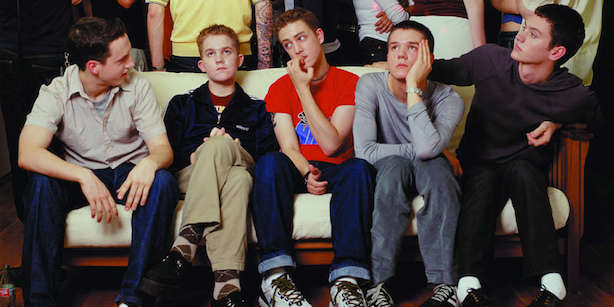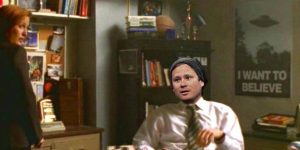 Music
Music
The 13 best albums from the emo/pop-punk boom
by Rob Rousseau
February 23, 2016
13 turn of the century classics to destroy your eardrums in church basements.
Around the turn of the century, mainstream pop radio was in a truly dismal state. Annoyingly saccharine boybands dominated one end of the spectrum, while offensively terrible rap-rock had risen to inexplicably popular heights and provided the heavier alternative. If you were an angsty suburban kid who liked loud, distorted guitars but still wanted to hear a few hooks from time to time, you were basically unrepresented.
It was a potent environment for a new sound to gain popularity, and while the emo/pop-punk boom that began around this time would wind up packing arenas and topping radio charts (and become, in many cases, just as insufferable as what was being replaced), these 13 albums helped pave the way and provided a fresh alternative to a generation that was just learning to live with love and loss, and wanted to do so while destroying their eardrums in sweaty church basements.
Saves The Day – Through Being Cool
While their first album Can’t Slow Down drew (justified) criticism for hemming a little too close to the sound of punk pioneers and fellow New Jersians Lifetime, 1999’s Through Being Cool found Saves The Day coming into their own with 40 solid minutes of loser-anthem perfection, led by singer Chris Conley’s unique combination of “aw shucks” boy-next-door-ism and strange fascination with visceral body horror.
New Found Glory – New Found Glory
Nothing Gold Can Stay redefined what pop-punk could sound like, fusing hardcore-influenced grooves and riffs with infectious melodies and sensitive lyrics about girls, but New Found Glory’s self-titled 2000 LP showed that the band was capable of far more than playing to half-full venues of jaded hardcore kids as the opening act for the heavier bands they had actually come to see.
Blink-182 – Enema of the State
After scoring a major hit with “Dammit” in 1997 Blink needed to deliver in a major way on the followup, and they did, to the tune of a staggering 15 million album sales. This not only cemented them as international stars, but legitimized the genre in its modern form for the generation of bands that followed in their footsteps.
The Get Up Kids – Something to Write Home About
The overwhelmingly positive critical and fan reception to Something To Write Home About put The Get Up Kids in a position to achieve genuine mainstream success. Unfortunately, they weren’t able to capitalize on this with the more abrasive, introspective On A Wire, which divided their fanbase and failed to excite the mainstream rock critics who were now paying attention. Still, Something To Write Home About remains an undeniable second-wave emo classic.
The Anniversary – Designing a Nervous Breakdown
The Anniversary shared a similar, synth-heavy pop sound to The Get Up Kids, who were also Vagrant Records labelmates, but vocalist-keyboardist Adrianne Verhoeven gave them a uniqueness that allowed them to build their own devoted fanbase and made Designing a Nervous Breakdown one of the strongest albums of the era.
While emo/pop-punk around this time took justifiable criticism for seeming to be made almost exclusively by and for men, Verhoeven and The Anniversary helped make the burgeoning genre feel a bit more inclusive and helped pave the way for bands like Paramore to achieve enormous success just a few years later.
The Starting Line – Say It Like You Mean It
The Starting Line’s 2002 LP is quite possibly the masterwork of the era-defining Drive Thru Records ouvre. Produced by genre uberproducer Mark Trombino, it is pop-punk distilled into its purest form, mixed with high-fructose corn syrup, poured into a syringe and injected directly into your heart like Uma Thurman in Pulp Fiction.
Gob – The World According to Gob
Gob spent years carving out a niche for themselves in the Canadian punk rock scene but scored a legitimate hit with The World According to Gob in 2001. Certified Gold by the CRIA, the album proved that the band could not only survive, but thrive on a mainstream level.
Simple Plan – No Pads, No Helmets…Just Balls
After their first single “I’m Just A Kid” charted modestly, Simple Plan was in danger of fading into pop-punk obscurity. Given a rare second opportunity, the band took advantage in the biggest possible way, as second single “I’d Do Anything” (featuring a guest vocal by Blink’s Mark Hoppus) became a big hit and helped set the stage for their Bob Rock-produced followup album, Still Not Getting Any, which turned them into massive international stars.
Brand New – Deja Entendu
Deja Entendu expanded on the more-traditional pop-punk of Brand New’s previous album Your Favorite Weapon and pushed the band and the genre into new directions. They added a more diverse set of influences like The Smiths and The Cure to their Warped Tour-ready sound to achieve previously-unheard of critical success. This allowed Brand New to escape the mall-punk stigma that many of their contemporaries were never able to shed.
Taking Back Sunday – Tell All Your Friends
Victory Records was mostly known for hardcore and metal bands like Snapcase, Earth Crisis, and All Out War when they released Taking Back Sunday’s Tell All Your Friends in 2002. It proved to be a smart move, expanding the label’s sonic territory and fanbase behind the band’s strong, emotive songwriting and unique dual-vocalist attack of Adam Lazzara and John Nolan.
Yellowcard – Ocean Avenue
As the pop-punk tidal wave was crashing over mainstream rock radio, Yellowcard were able to take full advantage of the new receptive commercial audience with Ocean Avenue, which put their own unique spin on the genre with its focus on the violin, and was eventually certified gold in the US.
Jimmy Eat World – Jimmy Eat World
After working for years building a devoted fanbase and releasing a genuine emo classic with Clarity, Jimmy Eat World made themselves massive mainstream stars with this album (also produced by Mark Trombino) off the huge single “The Middle.” Originally released as Bleed American in July 2001, the album was re-branded after the events of September 11th made anything that could be vaguely construed as unpatriotic toxic to labels and retailers. Fortunately, this didn’t slow them down on their rise to the top of the charts.
Sum 41 – All Killer, No Filler
It was at first easy to write off Sum 41 as Blink rip-off skatepunk also-rans after their first EP Half Hour of Power achieved modest success in Canada. All Killer, No Filler proved there was more to them that that, as they expanded their sound to include elements of hair metal and, strangely, ’80s hip-hop, leading to a genuine international monster hit with “Fat Lip.”
Tags: Music, Lists, blink-182, brand new, emo, GOB, Jimmy Eat World, New Found Glory, pop-punk, saves the day, Simple Plan, Sum 41, Taking Back Sunday, the anniversary, The Get Up Kids, the starting line, Yellowcard





